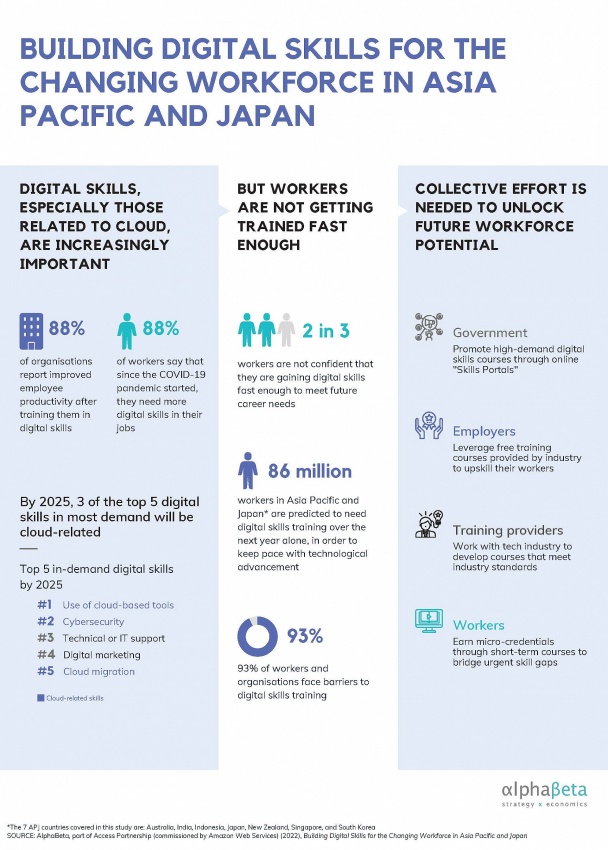Incredible growth in demand for digital professionals
 |
| Amazon Web Services has witnessed incredible growth in demand from customers for digital professionals over the past decade |
To better understand the rapidly evolving workforce landscape and to help its customers address the barriers to digital skilling, Amazon Web Services (AWS) has commissioned AlphaBeta to examine the needs of organisations across seven different countries. The research surveyed over 7,000 staff in both technical and non-technical roles and more than 2,000 employers across the region.
Released on March 25, AlphaBeta’s report found that the countries studied will collectively need to train an estimated 86 million employees over the next year to keep pace with technological advancements – equivalent to 14 per cent of their current workforce.
The report outlines key insights and provides examples of how governments, employers, training providers, and the technology industry can come together to meet this challenge.
 |
| An extract from the report |
Cloud computing and cybersecurity rank among the most needed digital skills
The report’s findings demonstrate the urgency for new skills while pinpointing the areas that will be in the highest demand.
Leading among these is the ability to use cloud-based tools for development, communication, accounting, and customer relationship management. Cloud adoption has become a critical part of organisations’ digital transformation process thanks to the ease, flexibility, and scalability that it offers.
As more organisations transition to the cloud, the need to maintain the trust of their beneficiaries grows. This means upholding the highest levels of security to prevent data loss and comply with data privacy regulations.
Understanding the looming shortfall
The report shows that staff members understand the need for digital skills in their professional lives, with 88 per cent saying they needed more skills to cope with changes in their jobs, and 64 per cent feeling that they will require training in cloud-related skills to progress in their careers.
It also illustrates that digital skills training benefits employers. 85 per cent of organisations in the study stated that digital skills training would help to fast-track their digitalisation goals, 90 per cent expected a rise in employee satisfaction, and 88 per cent said it would improve productivity.
However, although 97 per cent of surveyed organisations recognised the need to train their workers in digital skills, only 29 per cent have implemented plans to do so. The report found that 93 per cent of organisations and staff faced barriers preventing them from accessing the digital skills they needed.
The two most common were limited awareness of the available options and a lack of time to pursue the training. This shows a training shortfall that could hinder growth in the workforce and limit entire economies.
How the public and private sectors can meet the challenge
According to AlphaBeta, if these countries are to meet their training goals, governments, training providers, and employers must work together. AWS is committed and it recognises the need to take immediate action.
AlphaBeta recommends promoting high-demand digital skills courses through online training portals and leveraging no-cost industry training courses to upskill the workforce. For instance, the SkillFinder portal in Australia connects small- and medium-sized businesses with digital skills training courses. The platform contains over 1,000 digital micro-skills courses developed by leading technology companies like AWS.
The report states that training providers should work with experts from educational institutions and technology companies to develop courses that meet industry standards. Governments should work to help people to upskill quickly, broaden their employment opportunities, and bridge the skills gaps.
Fostering digital skills in underserved communities
One of the report’s key findings is the need to provide training to underserved groups in society as they tend to face greater challenges in accessing training opportunities. These include women, at-risk youths, unemployed individuals, rural communities, and low-skilled migrant workers.
AWS believes that the opportunities in digital careers should be accessible to anyone who has a willingness to learn. The company is spending hundreds of millions of dollars to provide no-cost training as part of its effort to help 29 million people worldwide to grow their technical skills by 2025.
Building a diverse and skilled global community for the digital future
As organisations continue to undergo digital transformation at an accelerating rate, investing in training has become imperative. Some countries have taken the first step, but they need more initiatives to bridge the digital skills gap.
To build a diverse and competent workforce, governments, training providers, and employers must work together to provide more accessible and targeted skills training.
What the stars mean:
★ Poor ★ ★ Promising ★★★ Good ★★★★ Very good ★★★★★ Exceptional
Themes: Digital Transformation
- PM sets five key tasks to accelerate sci-tech development
- Ho Chi Minh City launches plan for innovation and digital transformation
- Dassault Systèmes and Nvidia to build platform powering virtual twins
- Sci-tech sector sees January revenue growth of 23 per cent
- Advanced semiconductor testing and packaging plant to become operational in 2027
Related Contents
Latest News
More News
- SK Innovation-led consortium wins $2.3 billion LNG project in Nghe An (February 25, 2026 | 07:56)
- THACO opens $70 million manufacturing complex in Danang (February 25, 2026 | 07:54)
- Phu Quoc International Airport expansion approved to meet rising demand (February 24, 2026 | 10:00)
- Bac Giang International Logistics Centre faces land clearance barrier (February 24, 2026 | 08:00)
- Bright prospects abound in European investment (February 19, 2026 | 20:27)
- Internal strengths attest to commitment to progress (February 19, 2026 | 20:13)
- Vietnam, New Zealand seek level-up in ties (February 19, 2026 | 18:06)
- Untapped potential in relations with Indonesia (February 19, 2026 | 17:56)
- German strengths match Vietnamese aspirations (February 19, 2026 | 17:40)
- Kim Long Motor and AOJ Suzhou enter strategic partnership (February 16, 2026 | 13:27)

 Tag:
Tag:























 Mobile Version
Mobile Version